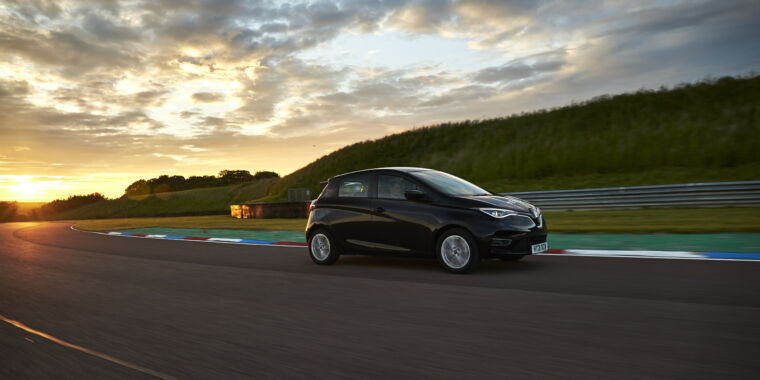
-
On June 10, a team of UK veterans, a military spouse, and a hypermiling expert set a new world record for EV efficiency.Mission Motorsport
-
A pair of Renault Zoe EVs with 52 kWh batteries spent 24 hours slowly lapping the Thruxton race circuit in England.Mission Motorsport
-
If my math is correct, this works out to 26 hours to complete the run, but Mission Motorsport’s release says it was “around 19 mph” and “24 hours.”Mission Motorsport
-
One of the two Zoes was fitted with a new tire developed by Enso. That car returned an amazing 9.14 miles/kWh.Mission Motorsport
I’m a little out of step with the mainstream when it comes to electric vehicle efficiency. I believe that as long as your electricity is clean and your battery has enough range to get you where you’re going (with the occasional DC fast-charge for a longer trip), even the least efficient EV will beat anything with an internal combustion engine—particularly if that EV replaces something inefficient like a sports car or a big SUV. Most people think this idea isn’t enough, though, and whoever can go the farthest on the fewest kWh wins.
As of Thursday, there’s a new winner. A British veterans nonprofit called Mission Motorsport spent 24 hours driving a pair of Renault Zoes (with 52 kWh battery packs) around the Thruxton racetrack in England. The 2.4-mile (3.8-km) circuit is one of the UK’s fastest, but the record-setting Zoe averaged around 19 mph (30.5 km/h). That was good for 475.4 miles (765 km) on a single charge, which works out to be 9.14 miles/kWh (14.71 km/kWh).
The winning Zoe was entirely standard, except for a set of tires developed by a company called Enso. The second Zoe ran on its factory-fitted rubber and still managed 424.7 miles. That’s a lot better than the car’s WLTP range of 245 miles (394 km) and works out to an efficiency of 8.16 miles/kWh (13.13 km/kWh).
“Thruxton was the obvious choice for this record attempt, but despite being the UK’s fastest track, the key to hitting 475.4 miles was finding the optimum speed and smooth, consistent driving,” said James Cameron, Mission Motorsport’s CEO, in a statement. “Backed by Enso’s unique EV tire technology, we were certain we could break the record, but what we couldn’t have foreseen was the incredible difference in efficiency, distance, and feel with the Enso tires.”
Mission Motorsport says its aim was to beat a 2018 record set in France that also came from a Renault Zoe. That attempt used a Zoe with a 41 kWh battery and traveled 351 miles (565 km) before coming to a halt. Unlike this week’s Mission Motorsport event, that demonstration was conducted on Paris’ Peripherique ring-road. Driving on a public road required a greater average speed—27.7 mph (44.6 km/h) to be precise—and resulted in an efficiency of 7.9 miles/kWh (12.7 km/kWh).
In fact, there’s a more impressive hypermiling record, also from 2018, that was also just dethroned. That record was set using a Tesla Model 3, which spent 32 hours circling a 1-mile (1.6-km) loop in Denver. During that time, the Model 3 covered 606.2 miles (975 km), and although it wasn’t particularly happy at the end of the marathon run, it managed to travel 9.09 miles (14.68 km) for every kWh used.
The record for the longest distance driven by an EV on a single charge is 999.5 miles (1,608.5 km), set by a specially modified BMW in 2017—it probably won’t be in danger for a while.
Listing image by Mission Motorsport
https://arstechnica.com/?p=1772460

